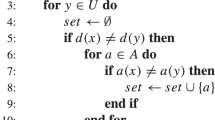Abstract
The rough sets theory developed by Prof. Z. Pawlak is one of the tools used in intelligent systems for data analysis and processing. In modern systems, the amount of the collected data is increasing quickly, so the computation speed becomes the critical factor. One of the solutions to this problem is data reduction. Removing the redundancy in the rough sets can be achieved with the reduct. Most of the algorithms of generating the reduct are only software implementations, therefore having many limitations coming from using the fixed word length, as well as consuming time for fetching and processing of the instruction and data. These limitations make the software-based implementations relatively slow. Unlike a software, the hardware systems can process the data faster than software. In this paper, the hardware implementation of the two-stage greedy algorithm to find the one reduct is presented. The first stage of the algorithm is calculating the core using the discernibility matrix, and the second is enriching the core with the attributes that are necessary to build the reduct. The presented algorithm was implemented in Field Programmable Gate Array (FPGA) as a digital device consisting of blocks that process the data in a single step. For the research purpose, the algorithm was also implemented in C language and run on a PC. The times of execution of the reduct calculation in hardware and software were considered. Obtained results show an increase in the speed of data processing.
Access this chapter
Tax calculation will be finalised at checkout
Purchases are for personal use only
Similar content being viewed by others
References
Kopczyński, M., Grześ, T., Stepaniuk, J.: FPGA in rough-granular computing: reduct generation. In: WI 2014: The 2014 IEEE/WCI/ACM International Joint Conferences on Web Intelligence, Warsaw, vol. 2, pp. 364–370. IEEE Computer Society (2014)
Kopczynski, M., Grzes, T., Stepaniuk, J.: Generating core in rough set theory: design and implementation on FPGA. In: Kryszkiewicz, M., Cornelis, C., Ciucci, D., Medina-Moreno, J., Motoda, H., Raś, Z.W. (eds.) RSEISP 2014. LNCS (LNAI), vol. 8537, pp. 209–216. Springer, Cham (2014). https://doi.org/10.1007/978-3-319-08729-0_20
Kanasugi, A., Matsumoto, M.: Design and implementation of rough rules generation from logical rules on FPGA board. In: Kryszkiewicz, M., Peters, J.F., Rybinski, H., Skowron, A. (eds.) RSEISP 2007. LNCS (LNAI), vol. 4585, pp. 594–602. Springer, Heidelberg (2007). https://doi.org/10.1007/978-3-540-73451-2_62
Skowron, A., Rauszer, C.: The discernibility matrices and functions in information systems. In: Slowinski, R. (ed.) Intelligent Decision Support. Handbook of Applications and Advances of the Rough Sets Theory, pp. 331–362. Kluwer, Dordrecht (1992)
Pawlak, Z.: Elementary rough set granules: toward a rough set processor. In: Pal, S.K., Polkowski, L., Skowron, A. (eds.) Rough-Neural Computing. Cognitive Technologies, pp. 5–13. Springer, Heidelberg (2004). https://doi.org/10.1007/978-3-642-18859-6_1
Kopczynski, M., Grzes, T., Stepaniuk, J.: Computation of cores in big datasets: an FPGA approach. In: Ciucci, D., Wang, G., Mitra, S., Wu, W.-Z. (eds.) RSKT 2015. LNCS (LNAI), vol. 9436, pp. 153–163. Springer, Cham (2015). https://doi.org/10.1007/978-3-319-25754-9_14
Tiwari, K.S., Kothari, A.G., Keskar, A.G.: Reduct generation from binary discernibility matrix: an hardware approach. Int. J. Future Comput. Commun. 1(3), 270–272 (2012)
Stepaniuk, J.: Rough – Granular Computing in Knowledge Discovery and Data Mining. SCI, vol. 152. Springer, Heidelberg (2008). https://doi.org/10.1007/978-3-540-70801-8
Stepaniuk, J.: Knowledge discovery by application of rough set models. In: Polkowski, L., Tsumoto, S., Lin, T.Y. (eds.) Rough Set Methods and Applications. New Developments in Knowledge Discovery in Information Systems. Studies in Fuzziness and Soft Computing, vol. 56, pp. 137–233. Physica-Verlag, Heidelberg (2000). https://doi.org/10.1007/978-3-7908-1840-6_5
Acknowledgment
This work was supported by grant S/WI/1/2018 from Bialystok University of Technology and funded with resources for research by the Ministry of Science and Higher Education in Poland.
Author information
Authors and Affiliations
Corresponding author
Editor information
Editors and Affiliations
Rights and permissions
Copyright information
© 2019 Springer Nature Switzerland AG
About this paper
Cite this paper
Grzes, T., Kopczynski, M. (2019). Hardware Implementation on Field Programmable Gate Array of Two-Stage Algorithm for Rough Set Reduct Generation. In: Mihálydeák, T., et al. Rough Sets. IJCRS 2019. Lecture Notes in Computer Science(), vol 11499. Springer, Cham. https://doi.org/10.1007/978-3-030-22815-6_38
Download citation
DOI: https://doi.org/10.1007/978-3-030-22815-6_38
Published:
Publisher Name: Springer, Cham
Print ISBN: 978-3-030-22814-9
Online ISBN: 978-3-030-22815-6
eBook Packages: Computer ScienceComputer Science (R0)




